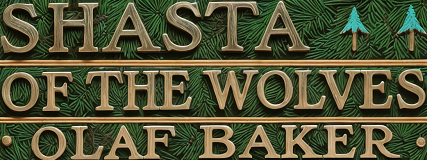 |  |
Wild at Heart Homepage | Contents | Previous Chapter
CHAPTER IV
THE END OF THE FIGHT
It was a running fight that went on as the great grizzly retreated. The one object of the wolves was to keep him on the move. The bear made furious rushes this way and that whenever he thought he had one of his enemies within striking distance. But as sure as ever he attacked one wolf, it leapt clear with marvellous agility, while the other, like a flash of grey lightning, had snatched at his flank and was off before he could turn. Yet in spite of Shoomoo’s greater bulk, it was the onset of Nitka which punished the bear most severely. For the time, Nitka was like a thing gone mad. Her eyes blazed like green jewels, her teeth flashed in a grin of rage. The long suppleness that was her body, bent, twisted, turned and doubled on itself, in a series of acrobatic leaps which bewildered her foe, and baffled even Shasta’s eyes to see how it was done. She was not fighting for any mere purpose of hatred or revenge; it was not that she, as Nitka, wanted to conquer the bear. The thing that was in her, the fierce unutterable thing that flamed in her eyes and stabbed nakedly in her teeth, was her wild, strange love for the man-cub she had so curiously made her own. She did not know why she loved him. How should she, since the Great Spirit of the Wild had not told her? It was enough that the Spirit had put the thing into her heart and made it to remain. Her own wolf-cubs would come, and would as certainly go out into the wolf world that is so wide beneath the stars. But the little man-cub stayed, winter and summer, autumn and spring, only growing larger very slowly, because it is the habit of men-cubs and other gods to grow slowly, and you cannot build them quickly with never so much rabbit’s flesh nor caribou meat, swallowed and pre-digested, and brought up again as food. So Nitka waged this desperate battle for the life of something she held very dear, and in her blind devotion would have sacrificed even her own life sooner than that one morsel of Shasta’s hairy little body should suffer harm.
With Shoomoo it was different. He had many reasons for fighting, and they were all good ones. First, he fought for Nitka because he loved her, and had mated with her for life. It was that which, when her long hunting cry for help had reached him, had sent him sweeping along the mountain slopes at such a headlong speed. Bound up with that, the man-cub was her own special property, and therefore partly his. He did not understand the man-cub. Shoomoo never pretended to understand. Left to his own instincts he would not have loved the man-cub. But since the thing belonged to Nitka, and was what she loved, therefore it was for him to be good to it whether he would or no. His second reason for fighting was just as good, and was that, naturally, the grizzlies and the wolves are enemies, and have nothing in common except the desire to kill, when the bloodthirst is on them. But there was even a third reason as good as either of the others, and this was that Shoomoo dearly loved a fight. It was not that he was a disagreeable person, always ready to pick a quarrel, for he was anything but that, and quite contented to go his own way peacefully so long as no one disputed it with him. But when a fight was forced upon him, or there was anything to be gained by being fierce, then he wrinkled back his chops in a most threatening maimer, and made ready for his deadly spring.
So all these reasons combined made Shoomoo a very dangerous foe, and were the causes which forced the grizzly, who might have coped with Nitka alone, to retreat towards the rock.
It took the bear some time to do this; but once he felt the rock against his back, he reared himself up on his haunches, with his little pig-like eyes red with rage, and towered above the wolves like the giant that he was.
Neither Nitka nor Shoomoo, savage though they might be, were so angry as to be fools. They knew perfectly well that to attack a grizzly in such a position would be the extreme of madness. One blow from one of those terrible steel-tipped paws, striking with the force of a sledge-hammer, and the wolf that met it would be knocked clean out of the fight. So they contented themselves with crouching at a safe distance, and waiting to attack again the moment the bear should leave the rock. But if the bear ever had such an idea in his huge head he thought better of it, and stayed where he was. And so the time passed, the wolves not daring to attack the bear, the bear not daring to quit the protection of the rock. And it was not until the afternoon had waned into evening, and the sunset gold had melted behind the deep forests, that the wolves drew back towards the den and the grizzly slipped away into the dusk.
It was many weeks before Shasta recovered from the effects of his fright and was ready to carry his explorations any distance from the cave. And though Nitka did not punish him, and Shoomoo said nothing, going about his business silently in the same old way, Shasta knew quite well that he was in disgrace and that he had better behave accordingly. So he contented himself by sitting a good deal in the doorway of the den and watching the happenings of the world from that safe position. It was not what you would call a very tidy doorway, and there was no mat on which to wipe your paws if you got them muddy with creeping after young geese along the boggy borders of the ponds on the barren. There was a fine litter of feathers, fur and bones, and the little odds and ends of what had once been game. Shasta, squatting humpily in the middle of the mess, looked out with large eyes to snap up the happenings in the world as they fell out through the hours.
Not that very much happened that you could call important. Sometimes a lynx or a fox would steal softly by, sniffing the air suspiciously, and keeping at a safe distance, with sidelong glances at the den. Or sometimes a shadow would appear and disappear between the stems of the pine trees with bewildering swiftness, and a marten would vanish upon his bloodthirsty way. And then, if larger game kept out of sight and smell, there were always the grasshoppers and woodmice chirruping and scurrying in the tall and feathery grass. But after a time Shasta grew tired of this do-nothing life at the door of the den, and began to take little walks here and there, though he kept a sharp look-out, and was always ready to go scampering back to the den at the first hint of danger. And one thing he learnt from his adventure with the grizzly was, always to attend to the warning of the blue jays. When ever their harsh voices rose from the ordinary gossipy chatter to a warning scream, Shasta would make off at once without waiting to discover what it was that had caused them to sound the alarm.